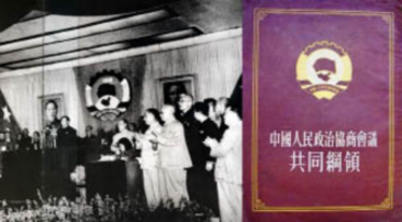Transformations of China’s Legal System
By staff reporter HUA ZI
From “rule of man” to “building a legal system,” to “rule of law” and finally, to the “rule of the Constitution,” the development of China’s legal structure epitomizes its learning curve of state governance.
|
 |
|
In September 1949, the Common Program of the Chinese People’s Political Consultative Conference (CPPCC), which bore the nature of a temporary constitution, was promulgated. |
From Rule of Man to Building a Legal System
The first building block of the PRC’s legal construction was the establishment of the socialist legal system.
In September 1949, the Common Program of the Chinese People’s Political Consultative Conference (CPPCC), which bore the nature of a temporary constitution, was promulgated. Five years later, the first constitution of the PRC was adopted at the First National People’s Congress (NPC). It is thus often referred to as the 1954 Constitution.
In the following 20-plus years, China encountered various setbacks in creating a legal system. At a meeting of the central leadership in November 1978, Deng Xiao-ping proposed that the legal system be enhanced in order to guarantee people’s democratic rights. At that time the Third Plenary Session of the 11th Central Committee of the Communist Party of China (CPC) was about to convene. China would soon enter a new stage of mind emancipation, reform and opening-up. The nation’s legal framework also breathed new life. People started to break restrictions and discuss issues that were previously considered taboo. “I think a new era dawned, one in which the science of law was awakening,” said Li Buyun, a researcher with the Institute of Law at the Chinese Academy of Social Science (CASS), when he recalled the events of over 30 years ago.
The Third Plenary Session of the 11th Central Committee of the CPC, which took place on December 18, 1978, has been referred to as a turning point in Chinese history. From Li Buyun’s point of view, this meeting marked the starting point of the rule of law in modern China. Deng Xiaoping contributed greatly to the rule of law in China. He believed that the primary precondition and decisive factor for the prosperity and lasting stability of a state was a sound legal system instead of one or two wise leaders, according to Li Buyun.
A communiqué of the session stressed that in order to safeguard democracy it was imperative to strengthen the socialist legal system so that democracy would become institutionalized and written into law – the only way to ensure the stability, continuity and full authority of the democratic system and its laws; laws had to be made, observed and strictly enforced, and law breakers must be prosecuted. From that point, legislative work was expected to occupy an important place on the agenda of the NPC and its Standing Committee.
The extensive legislative endeavors made in 1979 are the most obvious symbol of the new era in China’s construction of the legal system. Under Deng Xiaoping’s direction, a series of laws concerning different areas needed to be worked out as soon as possible. “It is better to have something than nothing,” Deng said. Therefore, legislation was expedited. In June 1979, the Second Session of the Fifth NPC formulated or amended seven laws including the Organic Law, Electoral Law, Organic Law of the People’s Courts, Organic Law of the People’s Procuratorates, Criminal Law, Criminal Procedure Law, and Law on Chinese-Foreign Joint Ventures, marking a big step in law and democracy.
The question of “rule of man” versus “rule of law” triggered a wide debate in China’s jurisprudential circle at the end of 1970s. The philosophy of the rule of law was gradually accepted by more and more people. “The debate, which lasted for nearly 20 years, laid a solid theoretical foundation for the CPC Central Committee and the NPC to set the ‘rule of law’ as a central strategy for state governance and ‘building the country on the basis of the rule of law’ as the country’s goal,” Li Buyun said.
